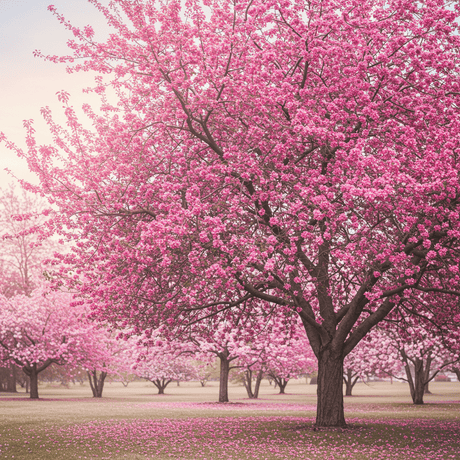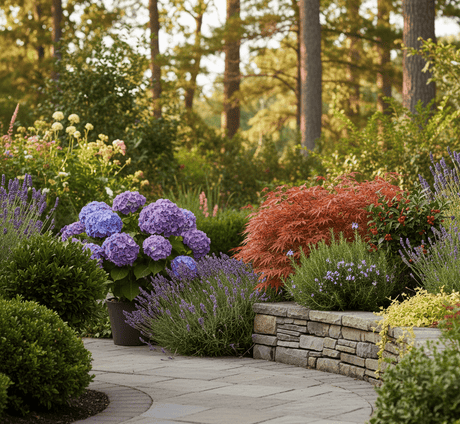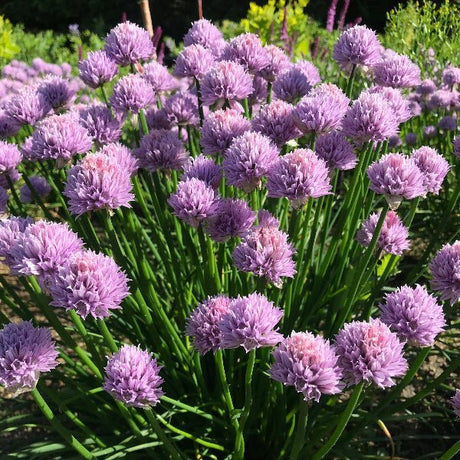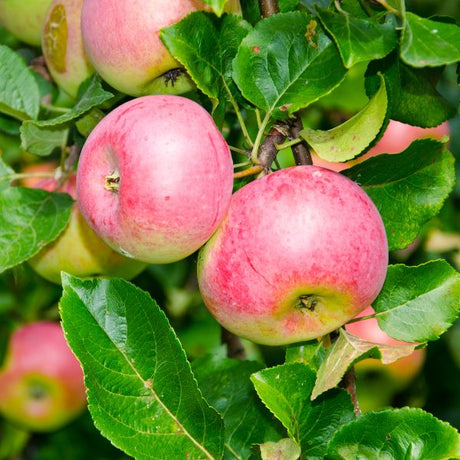Van Cherry Tree
Prunus avium 'Van'
- Stay Protected with Plant Sentry ™
Van Cherry Tree - #3 Container 3-4 Feet is backordered and will ship as soon as it is back in stock.
Plant Sentry™
Plant Sentry™

Plant Sentry™ Protected
Your order is protected by our compliance system that:
- Prevents restricted plants from shipping to your state
- Ensures plants meet your state's agricultural requirements
- Protects gardens from invasive pests and diseases
Delivery and Shipping
Delivery and Shipping
Delivery and Shipping
Fast, Safe Plant Delivery
Ships in 3-4 business days • Tracking provided • Weather protected
| Under $50 | $9.99 |
| $50 - $99.99 | $14.99 |
| $100 - $149.99 | $16.99 |
| $150 - $198.99 | $24.99 |
| $199+ | FREE |
✓ Zone-specific timing • ✓ Professional packaging • ✓ Health guarantee
Understanding Plant Options
Nature Hills offers plants in two main formats:
- Container Plants: Grown in pots with soil, sized by container volume and plant age
- Bare Root Plants: Dormant plants without soil, sized by height measurements
Container Plant Sizes
Container sizes indicate plant age and growing capacity rather than liquid volume equivalents. Our containers follow industry-standard nursery "trade gallon" specifications, which differ from standard liquid gallon measurements.
Young Plants (6 months to 18 months old)
| Container Size | Actual Volume | Metric Equivalent |
|---|---|---|
| 2" x 2" x 3" | 0.18 - 0.21 dry quarts | 0.20 - 0.23 dry liters |
| 4" Container | 0.31 - 0.87 dry quarts | 0.35 - 0.96 dry liters |
| 4.5" Container | 0.65 dry quarts | 0.72 dry liters |
| 6" Container | 1.4 dry quarts | 1.59 dry liters |
| 1 Quart | 1 dry quart | 1.1 dry liters |
| 5.5" Container | 1.89 dry quarts | 2.08 dry liters |
Established Plants (18 months to 2.5 years old)
| Container Size | Actual Volume | Metric Equivalent |
|---|---|---|
| 2 Quart | 2 dry quarts | 2.2 dry liters |
| #1 Container | 2.26 - 3.73 dry quarts | 2.49 - 4.11 dry liters |
| 5" x 5" x 12" | 3.5 - 4.3 dry quarts | 3.85 - 4.74 dry liters |
Mature Plants (2-4 years old)
| Container Size | Actual Volume | Metric Equivalent |
|---|---|---|
| #2 Container | 1.19 - 1.76 dry gallons | 5.24 - 7.75 dry liters |
| #3 Container | 2.15 - 2.76 dry gallons | 8.14 - 12.16 dry liters |
Large Plants (3-5 years old)
| Container Size | Actual Volume | Metric Equivalent |
|---|---|---|
| #5 Container | 2.92 - 4.62 dry gallons | 12.86 - 20.35 dry liters |
| #6 Container | 5.25 - 6.01 dry gallons | 23.12 - 26.42 dry liters |
| #7 Container | 5.98 - 6.53 dry gallons | 26.34 - 28.76 dry liters |
Bare Root Plants
Bare root plants are sold by height from the root system to the top of the plant. Plants may exceed minimum height requirements.
Common Sizes:
- Trees: 1 foot, 2 feet, 3 feet, 4 feet, 5 feet, 6 feet
- Shrubs & Perennials: 1 foot, 18 inches, 2 feet
Important Notes
Container Volume Specifications
- Trade Gallon Standard: Our containers follow industry-standard "trade gallon" specifications established by the American National Standards Institute (ANSI Z60.1) for nursery stock
- Volume Variations: Actual soil volume may vary due to plant root systems and growing medium settlement
- Age Indicators: Container size primarily indicates plant age and maturity rather than liquid volume equivalents
Growing Conditions
- Plant size can vary based on variety and growing conditions
- Container size helps indicate plant maturity and establishment level
- Larger containers generally mean more established root systems and faster landscape establishment
Seasonal Availability
- Bare root plants are available seasonally when dormant
- Container plants are available throughout the growing season
- Specific varieties may have limited availability in certain sizes
Questions?
For questions about specific plant sizes or availability, please contact our plant experts who can help you choose the right size for your landscape needs.
Plant Highlights
Van Cherry Tree highlights at a glance!
-
Botanical Name
-
Brand
-
Growing Zones5, 6, 7, 8, 9
-
Growth RateModerate
-
Mature Height
-
Mature Width
-
Leaf Color
-
Flower Color
-
Fall Color
-
Pollinator FriendlyYes
-
Pollinator Required
-
Bloom PeriodLate Spring
-
Harvest Time
-
FragrantYes
Characteristics
Where To Plant
When To Prune
- Late Winter
Water & Moisture Needs
- Moderate
Sunlight Needs
Soil Needs
- Widely Adaptable
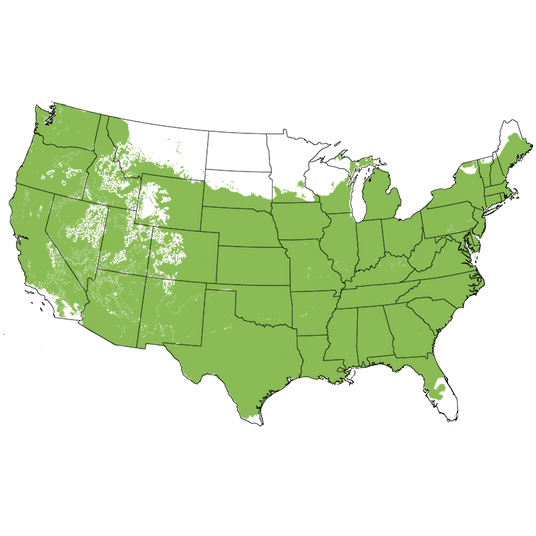
Growing Zones 5-9
One Fine Cherry Tree & Cold Hardy Too!
- Large, Red-Black Sweet Fruit
- Intense Cherry Flavor!
- Crack-Resistant
- Gorgeous White Blooms
- Large Sized & Adaptive to Pruning
- Lush Green Foliage & Great Shaped Tree!
- Cold Hardy
- Abundant Producer
- Late-Midseason Harvest
- Jellies, Jams, Pies, Preserves, Freeze & Fresh Eating!
- Recommended pollinators: Rainier, Stella & Black Tartarian
- Great Pollinator to Other Cherry Varieties
- 700 Chill Hours
Our Van Cherry Tree (Prunus avium 'Van') has a well-deserved reputation as one of the finest cherries for the home grower. It's among the cold hardiest of sweet cherries varieties and comes with loads of striking ornamental features!
Van provides a beautiful display each early spring when it becomes weighed down in clusters of lovely snow-white flowers, creating a show for the neighborhood!
Growers appreciate its shiny, serrated leaves and its medium-sized, upright, rounded form, making it a visual delight for both the front yard or the mini orchard out back!
The green foliage is contrasted by the dark-red cherries that hang by the handful, tempting you to reach up and grab a healthy and sweet-tart snack.
Fruiting by mid-June, this late mid-season variety produces sweet, shiny, red-black fruit. They resist cracks, so your harvest is bigger and bountiful.
The fruit is outstanding eaten fresh off the tree or can be used for jellies, jams, pies or preserves. Van cherries freeze well, so you can easily preserve your excess, or dry any excess cherries to add to a trail mix or snack mix!
How to Use Van Cherry Tree In The Landscape
Fantastic specimen and dual-purpose, edible landscaping trees. One of these in the front yard will add curb appeal and ornamental year-round interest, as well as delectable fruit! Tuck into a backyard home orchard or pretty row for privacy along the side of your property!
Plant as an anchor and shade for the corner of a shed or garage, or to shade your patio or garden beds.
There’s nothing like a reading nook beneath your Van Cherry when it’s in full bloom, or enjoying a summer picnic beneath the tree where you can easily pluck fresh cherries for snacking.
#ProPlantTips For Care
These hardy trees are best in USDA growing zones 5-9. Preferring full sun for the best fruit and health of your tree. Be sure to plant in a moderate, yet consistently moist site with regular watering.
Plant in an enriched, organic medium that has very well-drained soil. Mulch the root system well to maintain moisture and to better insulate the roots from heat and cold.
Prune to maintain your Van Cherry at a reasonable height under 8-10 feet so that netting and harvest are easier tasks. You will not want to give up a single piece of this wonderful fruit to birds, once you have tried it.
Not self-fertile, you’ll need another Cherry for cross-pollination, however, it is one of the best pollinators for other sweet cherries, so let ripening time and your taste be your guide in selecting your partner cherry variety. No room for 2 trees? Try high-density planting in our Cherry Tree Care Garden Blog!
For best results, fertilize your tree regularly with Dr. Earth Fruit Tree Fertilizer or a good organic, slow-release fertilizer.
You'll love the outstanding intense cherry flavor of the Van Cherry, one of the finest for the home grower. Order at NatureHills.com today before they’re gone!
Recommended pollinators: Rainier, Stella, & Black Tartarian
Arguably the Best Cherry One Can Eat
In its short time, and with very humble beginnings, Van Cherry has become one of the most important cherries of the 20th Century. As with so many of the modern varieties of cherries, Van was developed in the Summerland Agriculture Research Station in Summerland, British Columbia.
In 1936, A.J. Mann of the Summerland Station made the original cross using Empress Eugenie, an open pollinated selection as the primary parent. Empress Eugenie itself is a cross of Duke Cherry, a hardy Prunus avium crossed with a sour cherry variety from France, which added to its adaptability.
Van was selected by Mann in 1942 and named in honor of J.R. Van Haarlen of the Horticultural Experimental Station in Vineland, Ontario. Van was introduced commercially in 1944. Recognized for its ability to compete with the Bing in harsher climates, the Van was noted for its resistance to doubling, cracking and splitting. Van's quality compared to that of the Bing but boasted a firmer texture.
Van become popular quickly, but the focus in the 1950's and 60's was on creating self-fruitful varieties. The introduction of the self-fruitful Stella Cherry in the early 1970's gave the Van a lot of commercial competition.
Today, Van remains one of the most dependable cherry varieties for the home garden in Zones 4 - 9. It is also a popular contributor for creating new hybrids. With Van's outstanding attributes, hybridists have used it to create many of the popular varieties known today. First and foremost, the Rainier cherry is a Van Cherry cross. Lapin's Cherry also has Van as a parent plant, and is fast becoming the most popular variety planted both in the commercial and the home garden.









